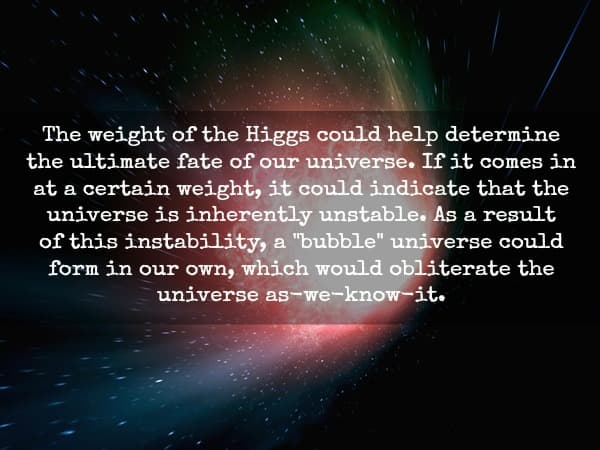Question: "After the detection of the Higgs boson, a few articles went up in the news claiming scientists have now figured out exactly how and approximately when our universe will end. Exactly how did they use this information to come to those conclusions?"
Asked by: O'Dell Tannehill
Answer: Ahh. If there is one thing I like more than talking about the beginning of the universe, it's the end of it. And since physicists working at the Large Hadron Collider have confirmed the existence of a Higgs-like particle, we've had plenty "end of the world" material to speculate on. Now, before I get down to the nitty gritty and answer your question, let me take a moment to establish what the Higgs Boson is.
Firstly (and most importantly) the Higgs Boson fills in one of the last missing pieces to the standard model of particle physics; the so-called "holy grail" of theoretical models. (Let me say that with or without the Higgs, it's still not complete. It doesn't include a full-scale description of gravity, dark matter, dark energy or neutrino oscillations) Not only does it explain how the four forces of the universe work together to produce the characteristics of particles interactions, but it also offers some insight into how the universe might evolve far down the line.
Secondly, the Higgs explains how elementary particles are imparted with mass (without the Higgs and the Higgs field, the universe would be a very different place). This is important for several reasons, but namely because the overall mass of the universe plays a role in its stability. This is where the Higgs comes into play. As stated, the Higgs plays an important role in granting particles mass. Depending on the mass of the Higgs itself (including the mass of the remaining subatomic particles, like the top quark), it may be that if it's heavier than expected, the universe may exist in some sort of a perpetual "metastable" state.
If so, in several billions of years, a new bubble universe might start to grow inside of our own. Such a universe would arise by quantum fluctuations and since said universe may arise with a different - more favorable - energy level, this bubble could eventually expand faster than the speed of light - wreaking havoc in its wake. According to Joseph Lykken, who is a theoretical physicist from the Fermi National Accelerator Laboratory (he's also heavily involved in ongoing work at the Large Hadron Collider, which is on a 2 year hiatus for equipment upgrades), the Higgs will likely weigh in at around 126 billion electron volts - "a critical number for determining the fate of the universe."
Obviously, we still have a lot of information we need to unravel before we can rule definitively on the weight of the Higgs. Heck, we still have a lot of work left to do unraveling the very nature of the universe. So at this point, speculation is all this is. (I'll admit, it's very interesting speculation, but speculation none-the-less) I do want to note that this would have another compelling consequence. It could mean that our universe is but one incarnation originating during an infinite cycle of metavacuum instability events. (This is definitely much cooler than the big bang!)
Share This Article
